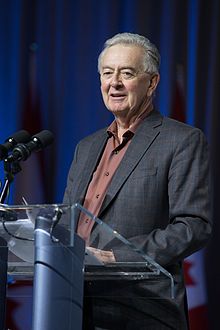Preston Manning
Appearance

Ernest Preston Manning CC (born 10 June 1942) is a Canadian politician. He was the only leader of the Reform Party of Canada, a Canadian federal political party that evolved into the Canadian Alliance. He sat in Parliament for the Canadian Alliance until his retirement from federal politics in 2002, after which it in turn merged with the Progressive Conservative Party to form today's Conservative Party of Canada.
Quotes
[edit]The New Canada (1992)
[edit]- New Canada must be workable without Quebec, but it must be open and attractive enough to include a New Quebec.
- Author's Preface, viii
- As a result of listening to Aberhart, my father decided to leave the farm in 1927 to study at Calgary Prophetic Bible Institute, Aberhart's training school.
- Chapter One, Prairie Populism, p. 8
- In many respects, my best friends were dogs.
- Chapter Two, Transitions, p. 33
- My religious training told me that in times of personal uncertainty one should seek God's direction through personal prayer and study of the Christian scriptures.
- Chapter Two, Transitions, p. 35
- My first official consulting job, therefore, was for a scrap metal dealer (he resented the term "junk dealer") in East Edmonton named Benny Sugarman.
- Chapter Three, Adventures in the Marketplace, p. 53
- In fall 1967, I was given leave of absence by the National Public Affairs Research Foundation to move to Redondo Beach, California, to work on a short-term research contract with TRW.
- Chapter Three, Adventures in the Marketplace, p. 55
- During his long political career, my father was always active in communicating the Christian gospel from the evangelical perspective,...
- Chapter Four, The Spiritual Dimension, p. 95
- Besides my religious commitment, the greatest single factor that has enabled me to pursue my business and political objectives has been the security and freedom of my home.
- Chapter Five, The Importance of Home, p. 110
- Albertans are very competitive, and to a large extent are competing against themselves. They do not simply compare their economic and political standing with that of the other provinces, but they compare the Alberta that "is" with the Alberta that "could have been" or "could still be". In other words, part of western alienation stems from frustrated ambitions, unfulfilled expectations, an the tragedy of unrealized potentials-the crop that might have been if the hail had not come, the fortune that might have been made if the well had been drilled three miles farther north. Such sentiments deeply affect how many westerners think about themselves and the country as a whole.
- Chapter Six, Regional Alienation, p. 122
- The communications challenge faced by reform movements the world over and illustrated by this incident is this: in the modern communications business, particularly in the case of television, negative is more newsworthy than positive; short term is more newsworthy than long term; disagreement is more newsworthy than agreement; emotion-laden critiques are more newsworthy than well reasoned proposals for constructive change; discord, threats to order, and bad government are much more newsworthy than peace, order, and good government.
- Chapter Seven, The Vancouver Assembly, p. 137
- People who been told that the Reform Party consists of well-meaning simpletons mouthing naive solutions to complex problems should study Harper's speeches on behalf of Reform.
- Chapter Eight, The Founding Assembly, p. 149
- The founders of the CCF were called communists. And Social Credit was frequently portrayed as a dangerous mixture of monetary unorthodoxy, religious fundamentalism, and grassroots fascism. It therefore came as no surprise tha the Reform Party was labelled, particularly in the early stages, as "fringe", "extremely right wing", potentially racist, and seperatist.
- Chapter Nine, The 1988 Federal Election, p. 158
- This not to say that the Reform Party appears to be the Canadian equivalent of the Republican Party or that I am trying to pass myself off as a modern-day Lincoln.
- Chapter Twelve, Expanding the Base, p. 222
- The first lesson, for all Canadians, is that the closed door, top down approaches to constitution making do not provide the public input or debate necessary to achieve a constitutional consensus that will be supported by the people.
- Chapter Thirteen, The Eventful Summer of 1990, p. 240
- The trouble with "sacrifices as symbolic acts" is that the immediate impact on those for whom the sacrifice is made quickly fades, while the impact on those who actually make the sacrifice can go on and on.
- Chapter Fourteen, Conflict and Consolidation, p. 255

- Nothing disturbs me more than superficiality and mere sloganizing on matters of public policy, and the suspicion that what the speaker is saying represents the full extent of his knowledge on the subject.
- Chapter Fifteen, A New National Party, p. 281
- There are hundreds of Canadian communities that have given more thought to hiring their rink manager than they have to electing their member of Parliament.
- Chapter Eighteen, The Road to a More Democratic Canada, p. 329
- The Reform Party does not, however, equate "high profile" with electability.
- Chapter Eighteen, The Road to a More Democratic Canada, p. 331
Quotes about Manning
[edit]- My suspicion was that Manning knew he could never become prime minister of Canada because of Quebec and, consequently, that he wouldn't have been terribly sorry to see it leave the federation.
- Jean Chrétien, My Years As Prime Minister, p. 132

